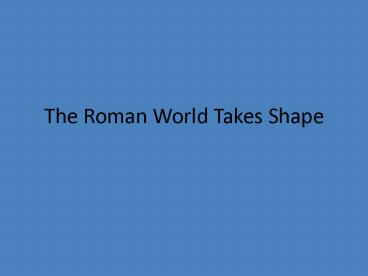The Roman World Takes Shape - PowerPoint PPT Presentation
1 / 21
Title:
The Roman World Takes Shape
Description:
The Roman World Takes Shape Unlike Greece, Italy was not broken into small valleys or divided by rugged mountains. Broad fertile plains to the north and west ... – PowerPoint PPT presentation
Number of Views:154
Avg rating:3.0/5.0
Title: The Roman World Takes Shape
1
The Roman World Takes Shape
2
Unlike Greece, Italy was not broken into small
valleys or divided by rugged mountains. Broad
fertile plains to the north and west supported a
growing population.
Geography helped to unify Rome
3
(No Transcript)
4
The Italian peninsula was centrally located in
the Mediterranean Sea. City on seven hills
5
About 800 B.C., the Latins migrated to Italy and
settled along the Tiber River.
- Greek colonists to the south and Etruscans in
the north shared the peninsula and contributed
engineering and religious ideas to Roman
civilization. - Legend says Rome was founded by twin brothers,
Remus and Romulus, the sons of a Latin woman and
the god Mars, giving Romans divine origins.
6
In 509 B.C., the Romans drove out the Etruscan
rulers and established a republic.
A republic from the Latin res publica, that
which belongs to the people, where people chose
some of the officials.
Laws were made by 300 land-holding, upper-class
patricians who made up the Senate.
The Romans felt a republic would prevent too much
power from going to any one individual.
7
(No Transcript)
8
Two patricians were selected to supervise the
government and command the army each term.
These two consuls only served one term and
checked or limited each others power.
In times of war, a single dictator was given
power, but only for six months.
The model dictator was Cincinnatus, who won a
great battle, celebrated, and returned to his
farm, all in 15 days.
9
(No Transcript)
10
The legacy of ancient Rome was to give commoners
a voice in government and safeguards on their
rights.
Made more democratic
Plebeians elected tribunes who could veto laws.
Laws were inscribed on stone tablets and placed
in the forum (marketplace) for all to read.
11
(No Transcript)
12
- First time written down
- Made it possible for plebeians to appeal judgment
handed down by a judge
13
- What was the makeup of the family in Roman life?
Who was in charge? - Male had absolute power, strict discipline,
demanded total respect - Wife subject to his authority and not allowed to
administer her own affairs - Woman was loving, dutiful, dignified, and strong
14
- What rights and freedoms did Roman women gain
over time? - Right to own property, go to public baths, dine
out, attend pubic entertainment with husbands,
learn to read and write - Always had more rights than Greek women though
15
Roman power grew over time. By 270 B.C. Rome had
conquered the entire peninsula.
- Roman armies were
- Made up of citizen soldiers
- Paid with a portion of the spoils
- Organized into 5,000 man legions
Roman citizens made good soldiers because they
were raised to value courage, loyalty and to
respect authority.
16
(No Transcript)
17
Romans treated most conquered people well.
People were generally allowed to keep their
customs, religion, money, and local government.
Some were granted full or partial Roman
citizenship.
Some were allowed to marry Roman citizens and
trade in Rome.
- As a result, many remained loyal to Rome.
- Had to acknowledge Roman leadership, pay taxes,
and supply soldiers for Roman army
18
Rome took measures to consolidate its empire.
Soldiers were posted throughout the land.
Engineers built a system of all-weather roads.
Trade and travel were encouraged, leading to the
incorporation of Latin into the language of local
peoples.
Slowly, Italy united under Roman rule.
19
The family was the basic unit of Roman society.
- The male head of the household had absolute
authority. - Women could own property and run businesses, but
most worked at home. - Children were educated. The wealthy often hired
Greek tutors.
20
Roman mythology was similar to that of Greece
with many gods and goddesses.
Jupiter Ruled over the sky and other gods
Juno The goddess of marriage
Neptune The god of the seas
Mars The god of war
Poseidon
Zeus
21
- Was religion a unifying force in Roman society?
- Community celebrations and festivals provided a
shared culture and a sense of community































